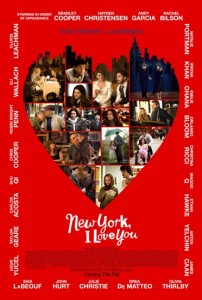film review: new york, i love you
From the producers of Paris J’Taime comes New York, I Love You, which features short films from 11 international directors, but falls short of its predecessor. Unlike the former, the film does not introduce each segment with the director/writers credits which I believe was a much more suitable way to structure such a film. As a result, the tone frequently changes, creating fragmented stories, some of which are more compelling than others.
I was not overly impressed by the opening episode, which sees Hayden Christensen play a pick-pocketer who later manages to steal the heart of Rachel Bilson’s character. The second segment, directed by Mira Nair, stars Natalie Portman as a woman who is about to marry a man from another religious background, but seems to romantically connect with a diamond merchant despite her wedding plans. A rather odd inclusion comes from director Brett Ratner whose episode sees a teenage boy taking a disabled girl to the prom (she is later revealed to be a method actress, who can in fact walk).
The story that puzzled me the most was written by the late Anthony Minghella (who the film is dedicated to), which sees an old and lonely ex-singer initially sharing an intimate moment with the young Russian hotel attendant (played by Shia LaBeouf) before she imagines him jumping off her hotel balcony. The scene then cuts to an older hotel assistant (played by John Hurt) who repeats LaBeouf’s earlier comments as if he had never existed. The white set design and high key lighting, coupled with the loud operatic music creates a rather dramatic and surreal atmosphere, but the narrative is somewhat ambiguous.
While New York may be “the capital of everything possible” (according to a taxi driver in the film) the various shots that are included of the New York skyscrapers between the episodes seem somewhat forced and artificial. Overall, the segments attempted to achieve continuity by including a few recurring actors and by focusing on the common theme of love, but the majority of the actors were unconvincing and the segments were too disjointed to provide substance.


